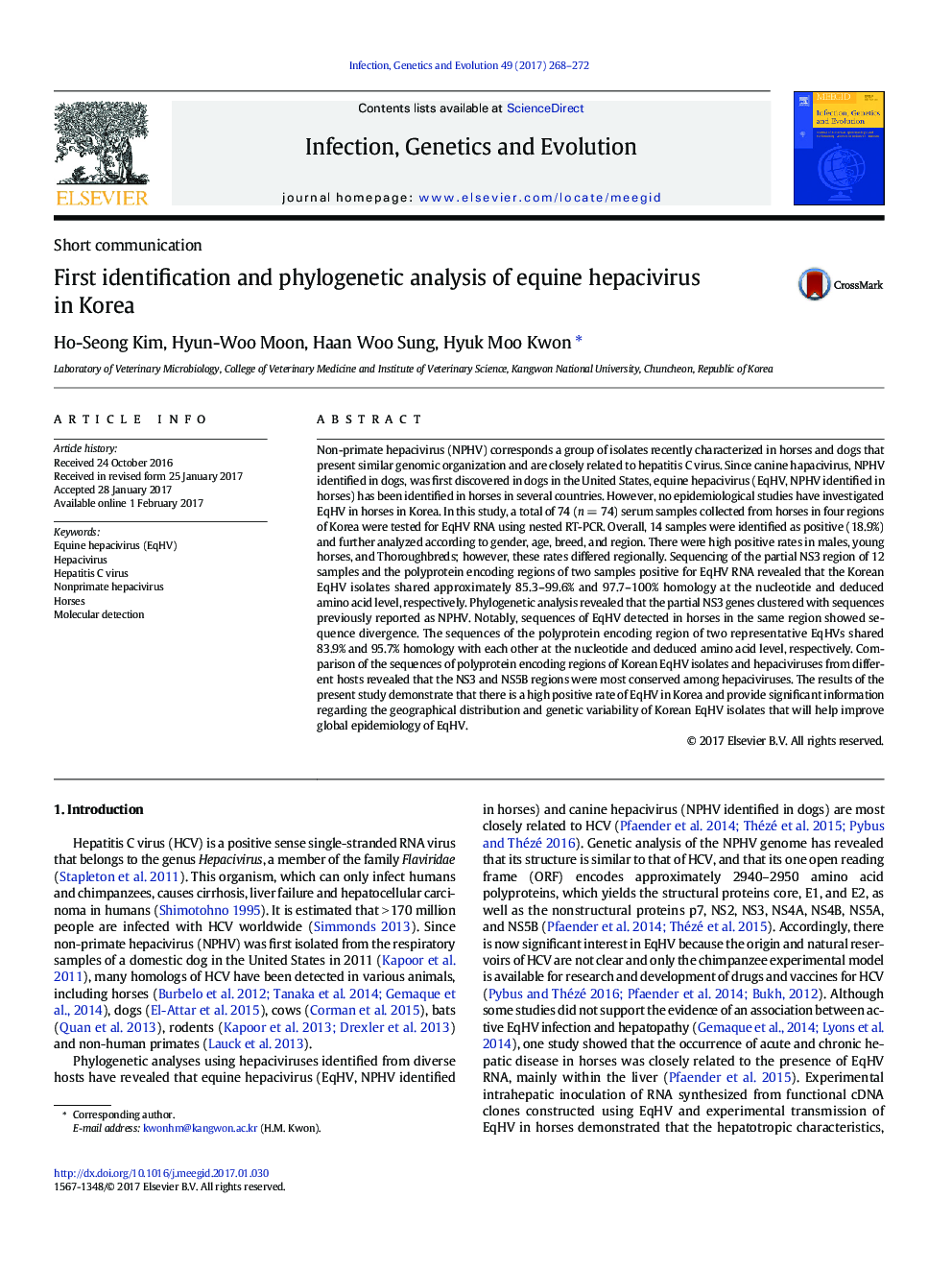| کد مقاله | کد نشریه | سال انتشار | مقاله انگلیسی | نسخه تمام متن |
|---|---|---|---|---|
| 5590644 | 1570154 | 2017 | 5 صفحه PDF | دانلود رایگان |
عنوان انگلیسی مقاله ISI
First identification and phylogenetic analysis of equine hepacivirus in Korea
دانلود مقاله + سفارش ترجمه
دانلود مقاله ISI انگلیسی
رایگان برای ایرانیان
کلمات کلیدی
موضوعات مرتبط
علوم زیستی و بیوفناوری
علوم کشاورزی و بیولوژیک
بوم شناسی، تکامل، رفتار و سامانه شناسی
پیش نمایش صفحه اول مقاله

چکیده انگلیسی
Non-primate hepacivirus (NPHV) corresponds a group of isolates recently characterized in horses and dogs that present similar genomic organization and are closely related to hepatitis C virus. Since canine hapacivirus, NPHV identified in dogs, was first discovered in dogs in the United States, equine hepacivirus (EqHV, NPHV identified in horses) has been identified in horses in several countries. However, no epidemiological studies have investigated EqHV in horses in Korea. In this study, a total of 74 (n = 74) serum samples collected from horses in four regions of Korea were tested for EqHV RNA using nested RT-PCR. Overall, 14 samples were identified as positive (18.9%) and further analyzed according to gender, age, breed, and region. There were high positive rates in males, young horses, and Thoroughbreds; however, these rates differed regionally. Sequencing of the partial NS3 region of 12 samples and the polyprotein encoding regions of two samples positive for EqHV RNA revealed that the Korean EqHV isolates shared approximately 85.3-99.6% and 97.7-100% homology at the nucleotide and deduced amino acid level, respectively. Phylogenetic analysis revealed that the partial NS3 genes clustered with sequences previously reported as NPHV. Notably, sequences of EqHV detected in horses in the same region showed sequence divergence. The sequences of the polyprotein encoding region of two representative EqHVs shared 83.9% and 95.7% homology with each other at the nucleotide and deduced amino acid level, respectively. Comparison of the sequences of polyprotein encoding regions of Korean EqHV isolates and hepaciviruses from different hosts revealed that the NS3 and NS5B regions were most conserved among hepaciviruses. The results of the present study demonstrate that there is a high positive rate of EqHV in Korea and provide significant information regarding the geographical distribution and genetic variability of Korean EqHV isolates that will help improve global epidemiology of EqHV.
ناشر
Database: Elsevier - ScienceDirect (ساینس دایرکت)
Journal: Infection, Genetics and Evolution - Volume 49, April 2017, Pages 268-272
Journal: Infection, Genetics and Evolution - Volume 49, April 2017, Pages 268-272
نویسندگان
Ho-Seong Kim, Hyun-Woo Moon, Haan Woo Sung, Hyuk Moo Kwon,